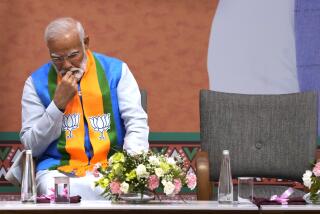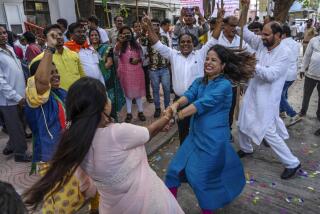No Majority Seen as India Counts Returns
- Share via
NEW DELHI — The Indian nation headed toward a new era of political uncertainty today as returns from the bloodiest and most dramatic elections in its history indicated that no single party will win a majority in the national Parliament.
It would be the second time in two years that India has faced a weak “hung Parliament,” and intensive back-room horse-trading was expected this week as political leaders struggle to form a new government.
Winners of all 511 seats at stake will not be declared officially until later today, but substantial returns from more than 400 constituencies clearly showed that every major party did worse than it had hoped in elections billed as a key test for the future of India’s secular and socialist traditions.
The Congress-I Party of former Prime Minister Rajiv Gandhi, whose May 21 assassination delayed much of the voting by nearly a month, was emerging as the largest single party, gaining back some of the seats that it lost when it was voted out of government in 1989’s elections.
But the party appeared to have failed in an attempt to use its leader’s death and the promise of a return to stability in polarized and strife-torn India as a springboard to a majority in Parliament.
The century-old Congress-I, which led India for all but 4 1/2 of its 44 years of independence, was leading or declared the winner for just 193 seats in an election that analysts said the party had to win to remain the most powerful single force in national politics.
India’s best-known pollster, Prannoy Roy, who anchors national election coverage for state-owned television, projected that the party founded by Gandhi’s grandfather, Jawaharlal Nehru, would win only 210 seats and be supported by regional allies holding an additional 15 seats, forcing it to search for coalition partners to be able to form a government.
Similarly, the Hindu revivalist Bharatiya Janata Party (Indian People’s Party), which had hoped to double the 86 seats it won in 1989 by using Hinduism and a crusade to build a new religious temple as its key campaign planks, was leading in just 95 constituencies. BJP nevertheless was emerging as the nation’s largest opposition force, with Roy projecting that it will win 115 to 120 seats.
The biggest loser was the Janata Dal (People’s Party) and its leader Vishwanath Pratap Singh, who governed as prime minister for more than a year after forging a coalition Cabinet in 1989. The coalition was formed after every major opposition party combined to defeat Congress-I in a vote against perceived corruption and incompetence during Gandhi’s five-year government. Singh’s party was leading Sunday in only 40 contests, more than 100 fewer than it tallied 18 months ago.
Another loser was ambitious caretaker Prime Minister Chandra Shekhar, who took over for Singh by persuading Gandhi to back him and a handful of Janata Dal defectors in another coalition government that lasted only three months. Shekhar’s newly formed faction was leading in only six constituencies nationwide.
Assessing the returns late Sunday, most political leaders concluded that the election, which left nearly 300 dead in campaign violence and polarized the nation along the lines of caste and faith, left little cause for celebration in any political quarter.
Ram Jethmalani, a Janata Dal leader and longtime social activist, said: “The electorate has given its great contempt--acute contempt--for all politicians in this country.”
Figures released by the election commission put the overall turnout in three days of voting carried out over a period of a month at 53%, the lowest in Indian history. Analysts said voting patterns indicated that, in most of the 22 states, voting was negative, directed against the party holding regional power.
A clear exception was in south India, particularly in the state of Tamil Nadu, where Gandhi was slain by a suicide bomber at a Congress-I election rally. There, Gandhi’s party and a regional allied party led by a popular film star not only was sweeping all 39 Parliament contests but also all 225 seats in the state Assembly.
So emotional was vote counting there Sunday that one campaign worker from a losing local party committed suicide as the results were announced. And actress-turned-politician J. Jayalalitha was near tears as she interpreted the sweep largely as the nation’s only detectable sympathy wave.
“It was Mr. Rajiv Gandhi’s dream to create a strong and unified India and to bring India into the 21st Century,” declared Jayalalitha, who was a close friend and admirer of the slain former prime minister. “We will support any measures to fulfill Rajiv Gandhi’s dream.”
It remained unclear today, however, just how the now-leaderless Congress-I will achieve those dreams.
In interviews Sunday and today, senior party members were deliberately evasive about their plans. They pledged to hold a meeting of their parliamentary committee in the next two days to choose a new party leader and candidate for prime minister, but they hedged about possible coalition partners.
The party’s current president, 70-year-old P. V. Narasimha Rao, was selected as a temporary compromise leader to end indecision and party infighting in the immediate aftermath of Gandhi’s death.
The election results underscored the emerging kingmaker roles of several regional Congress-I power brokers who are spoken of as possible party presidents and prime ministers.
Sharad Pawar, who was leading the party to victory in Bombay’s state of Maharashtra, has been the most prominently mentioned of three regional bosses, but he took pains Sunday night to duck the issue of future party leadership.
“My whole approach will be to keep unity in the party,” said Pawar, a firm capitalist and party reformer who was snubbed by Gandhi and his late mother and predecessor as prime minister, Indira Gandhi, for publicly challenging their decisions.
Similar responses came from two emerging party bosses in the central Indian state of Madhya Pradesh, where they, too, were leading the Congress-I to a decisive victory over the BJP.
Since Congress-I’s new leadership is unlikely to emerge for a day or two, speculation turned today to possible coalition parties that the party could use to build a big enough force to win a vote of confidence in a session of Parliament that Indian President Ramaswamy Venkataraman has ordered for no later than Thursday.
With the largely centrist Congress-I and the right-wing BJP emerging as the two primary forces in Indian politics--a process many analysts speculated would form the basis of a future, two-party system in this politically fractious nation--most attention focused on the Left Front, a Communist alliance.
As occurred in 1989, the Communist parties together were leading in about 30 constituencies and were projected by pollster Roy to win at least 50. But the political left has fought bitter battles with Congress-I in the past.
Among the most critical post-election crises facing India is the crippled economy. Foreign exchange reserves are so depleted that it announced last week that India must sell hundreds of tons of gold to meet its rising balance-of-payments deficit.
Pranab Mukherjee, a Congress-I party elder and its current spokesman, conceded: “We will have to take some hard (economic) decisions, no doubt,” particularly if it must seek support from traditional opponents. Several Communist leaders have said they would support Congress-I if it makes certain concessions in future policies.
The greatest task facing the next government, however, is to restore peace to this shattered land, where weeks of numbing political violence were layered atop months of religious clashes surrounding the BJP’s campaign to build a Hindu temple in the northern town of Ayodhya and another controversy over attempts to fix quotas for low-caste Hindus in government jobs and university placements.
The political killings that took the lives of Gandhi and scores of other candidates and political workers exploded again Saturday night in the strife-torn, northern border state of Punjab, where elections have been deliberately delayed until June 22 so that the maximum number of security forces can be deployed there from other troubled states.
Police officials Sunday revised downward, from 110 to 76, the death toll in a massacre of passengers on two trains near the Punjab city of Ludhiana. Graphic accounts of survivors of the massacre underscored the depth of anarchy in Punjab and other states riven by secessionist movements.
Witnesses said that two gangs of Sikh militants, armed with AK-47 assault rifles, simultaneously stopped the two trains 15 miles apart by putting guns to the heads of their engineers.
Then, in teams of three, the militants, who have vowed to use random violence and political assassinations to force cancellation of the voting and further their goal of creating a separate Sikh state, went from car to car, ordering Sikhs to leave the train. They then opened fire on the Hindus, spraying each car with hundreds of rounds fired point-blank at the heads of the passengers, witnesses said.
Every political party, including Sikh militant factions that have chosen to contest the elections, condemned the massacre in the sharpest terms.
More to Read
Sign up for Essential California
The most important California stories and recommendations in your inbox every morning.
You may occasionally receive promotional content from the Los Angeles Times.












